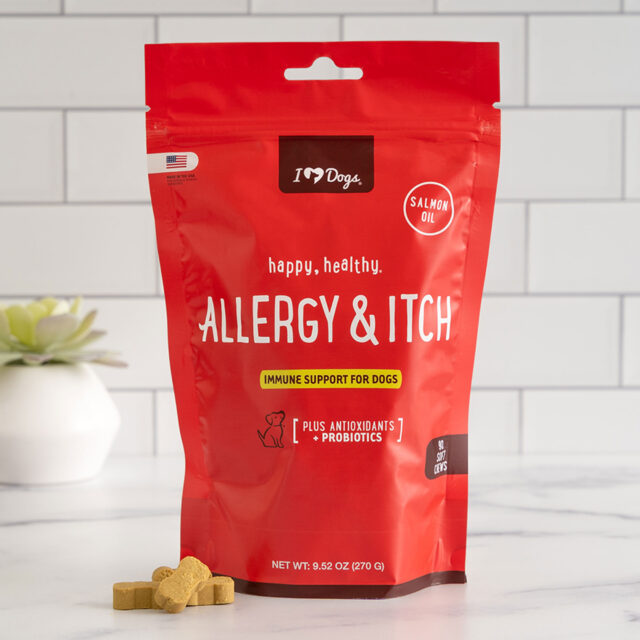All dogs will face some type of irritation, inflammation, or discomfort in their lives. Whether it’s skin conditions, joint pain, or digestion issues, your dog may be uncomfortable long before you realize it. So, pet parents need to stay on top of their furry friends’ health to reduce irritation as much as possible. Many ingredients, such as licorice root for dogs, can boost a pet’s health in various ways.
Licorice root is often used in supplements to reduce skin inflammation, but it doesn’t stop there. Dogs who eat this ingredient may experience a wide range of health benefits, allowing them to feel as content as possible!

What is Licorice Root for Dogs?
When most people hear “licorice,” they think of the red and black candy that’s often used as a road trip snack. However, licorice candy usually doesn’t have any licorice in it at all. Natural licorice is a legume that’s part of the pea family. The licorice plant resembles a sweet pea plant, but it’s the roots that are most commonly harvested and used for supplements.
Licorice root (Glycyrrhiza glabra) has been used as human medicine for thousands of years, specifically in Europe, China, and Ancient Egypt. Today, it’s regularly used in supplements for both pets and humans. A significant part of licorice root is glycyrrhizic acid/glycyrrhizin, which is one of the reasons it has so many health benefits.
Licorice root also serves as a natural sweetener. So, some humans have used it to wean off sugar. It’s sometimes given with other herbs and supplements to mask unpleasant tastes. Licorice leaves can be used for antimicrobial effects, but they’re not as helpful as the root.
Is Licorice Root Safe for Dogs?
Yes, licorice root is safe for dogs, as long as it’s dosed properly. It has anti-inflammatory properties that can boost your dog’s health in many ways. It also tastes better to dogs than most medications and supplements, so picky eaters may be more tolerant of it. Studies have shown its effectiveness in reducing inflammation for canines, but more research needs to be done on its other benefits.

It’s most effective if given for short periods or as directed by your vet. However, licorice root isn’t safe for pregnant dogs since there are no studies about how it could affect them.
Is Licorice Candy Safe for Dogs?
No, dogs cannot have red or black licorice candy. Licorice brands like Twizzlers rarely contain licorice root. Instead, they contain artificial fillers and preservatives that could be harmful to dogs. Not only is licorice candy high in sugar, but some companies use an artificial sweetener called xylitol. Xylitol is one of the most toxic foods for dogs because it could lead to liver failure or extremely low blood sugar if ingested.
Candy licorice is meant to smell and taste similar to the licorice plant, but it’s not real licorice. It’s made with anise oil to give it a sweet taste. If you look at the ingredient list for licorice candy, you’ll find that none of the ingredients are particularly safe or healthy for dogs. So, keep your sugary snacks to yourself.
Licorice Root Benefits for Dogs
Licorice root can be served to dogs in several ways, including topical solutions and oral supplements. How you use this ingredient depends on what aspect of your pup’s health you’re trying to heal. So, here are a few ways that natural licorice could benefit your furry friend’s well-being.
Soothes Skin Inflammation
Licorice root is best known for its anti-inflammatory properties. When applied topically or orally, it can soothe skin conditions like allergic reactions, contact dermatitis, bug bites, eczema, psoriasis, and bruises. You can serve it in the form of a chewable supplement, or you can apply a licorice root salve, balm, or liquid to the problem area. Both methods will likely be effective.
This ingredient can aid in healing skin because it contains glycyrrhizin, a glycoside that functions like an anti-inflammatory drug. Yet, it’s a natural option that reduces the risk of side effects. If your dog is suffering from skin irritation, ask your vet if licorice root will be an effective remedy for their condition.

Has Other Anti-Inflammatory Properties
Skin irritation isn’t the only type of inflammation that licorice root can assist with. It can also soothe internal body parts if taken orally. It can reduce inflammation related to digestion issues, joint pain, liver diseases, respiratory problems, and urinary infections. Licorice root won’t compromise the immune system in any way as it heals your dog. While reducing inflammation in certain organs, the ingredient’s properties may be able to benefit those areas of the body in other ways too.
Controls Digestion Problems
Leaky gut is a canine digestion problem that occurs when your pup’s intestinal lining gets damaged, allowing undigested food to escape into the bloodstream. The soothing effects of licorice root can protect the mucous lining of the gut, which can heal a leaky gut. If not cured in time, a leaky gut could lead to inflammation all over your dog’s body.
Acid reflux, indigestion, and an upset stomach are a few other digestion issues that licorice root might heal. Since digestion problems can quickly become severe, it’s important to talk to your vet about the best products and doses for your furry friend.
Provides an Immune System Boost
Dogs who take licorice root may get an immune system boost. Specifically, this ingredient aids the reticuloendothelial system. That part of your dog’s immune system is the first line of defense against infections. It provides special cells used to get rid of dead blood cells and any invasive microbes. Licorice root stimulates the special cells, causing them to become more effective.

Promotes Liver Health
For humans, licorice root was used in Chinese and Japanese medicine to detoxify the liver to treat hepatitis. For dogs, it can also be a great liver protector. The plant can improve the production of T-cells and interferon to keep the liver healthy. If your dog consumes toxins, licorice root can help remove the dangerous substances. It may also be able to help if your dog is experiencing jaundice.
Despite its improvements for the liver, it’s not recommended for dogs with end-stage liver disease. A vet should assess severe liver problems before giving your dog a remedy. So, licorice root may not be the most effective solution in those scenarios.
Prevents Respiratory Issues
If your dog consumes licorice root, it may be able to loosen up mucus in your dog’s lungs so they can expel it easier. It can reduce coughing and other cold and flu symptoms for dogs with respiratory issues. Since the root has natural anti-inflammatory properties, it may also soothe a sore throat.
Helps with Addison’s Disease
Addison’s disease occurs in dogs when the body doesn’t produce enough of certain hormones, such as cortisol and aldosterone. Since licorice root can work similarly to steroids, it can help treat the hormone deficiency without added risks. If your dog is suffering from this disease, you’ll want to talk to your vet about solutions. If they suggest licorice root, the dosage may be different than it would be for other conditions.
These many benefits are only the beginning of how licorice root can help your dog. You might notice your dog’s health improve in many unexpected ways while taking a supplement with this ingredient. With less discomfort, licorice root will also improve their mood and reduce stress.
How Much Licorice Root for Dogs is Safe?
The licorice root dosage for dogs varies greatly depending on the type of product you use and your dog’s needs. Some products contain pure licorice root, but supplements can be even more effective when they include other anti-inflammatory ingredients.

If you’re using licorice root topically to heal skin inflammation, only use enough to cover the irritated area. You can also add it to a solution of olive oil to make it more effective. Dogs may try to lick it off, but it won’t harm them if ingested.
For oral supplements, it’s best to look at the serving suggestion on the container. Most supplements will require your dog to eat one to three chews per dose. For liquid versions of licorice root, you can expect to serve your dog 12 to 20 drops for every 20 pounds of body weight. With powder supplements, you’ll usually give between 1/8 and 1/4 teaspoons for small dogs, 1/2 teaspoon for medium dogs, and 1 teaspoon for large dogs.
Yet, it’s important to remember that every product is different. The only way to decide the safest, most effective dosage for your dog is by consulting your vet first.
Potential Side Effects
For most dogs, licorice root is a safe and natural ingredient. However, if your dog has high blood pressure, heart conditions, or kidney problems, they shouldn’t take this ingredient. Those underlying conditions could put them at a higher risk of side effects. If you’re unsure whether or not your dog’s condition will be negatively affected by licorice root, ask your vet.
Some side effects of licorice root can raise blood pressure and sodium levels or cause water retention. The herb may also affect how your dog’s body absorbs calcium and potassium. An electrolyte imbalance could occur as well. Some pets may experience loose stools and vomiting, but side effects are rare unless they overdose.

It’s safest to give licorice root for a limited time until the inflammation goes away. Using it for longer than two to four weeks could increase the risk of side effects. If dogs have been taking it for weeks without any improvements, there may be a more serious issue. Also, if you notice any unusual behaviors after your dog starts taking a licorice root supplement, take them to a vet right away. It’s not recommended for severe conditions since a better remedy may be available.
Are There Any Drug Interactions?
Licorice root has very few drug interactions. You should avoid giving it to your dog if they’re taking blood thinners or corticosteroids. Be cautious when combining non-steroidal anti-inflammatory drugs (NSAIDs) with licorice root. This ingredient may increase steroidal activity, so avoid giving it with prednisone or other steroids.
As always, alert your vet of any medications and supplements your dog is taking before adding a new supplement to their diet. Veterinary professionals can confirm whether or not a licorice root supplement will be safe for your dog based on their medical needs. It’s better to be safe than sorry with your furry friend’s health!
Related: 10 Best Mushrooms for Dogs
How to Serve Licorice Root to Dogs
There are many ways to serve licorice root to your furry friend. If you’re looking for pure licorice root with no added ingredients, you should consider a tincture, powder, or dried extract. However, supplements that include licorice root with other ingredients are more common. They usually come in the form of liquid, tablets, or chews.
Most forms of licorice root are given to dogs orally. However, some products can be applied externally to heal a skin condition. If you’re looking to cure your dog’s skin allergies, both topical and oral methods can be effective.

You’ll likely come across licorice root products for both people and pets. Yet, you should stick to the ones made specifically for canines. Most human licorice root products are safe for dogs, but they could contain additional items that aren’t dog-friendly. So, it’s safest to stick to products made with your furry friend in mind.
Oral Supplement Options
Oral tablets are the easiest way to serve licorice root to your dog because they come in pills or chews. So, figuring out the dosage is easy. Supplements that look like pills may need to be covered by another food if your dog is picky. However, some chewy supplements look and smell like treats. So, your dog may be drawn more to those options.
Before choosing a supplement for your dog, make sure it’s from a company you trust. Look closely at the ingredient list to make sure it only includes items you feel comfortable serving your dog. When in doubt, ask your vet for advice.
Say Goodbye to Allergies!
If you’re looking for a licorice root consumable that can reduce inflamed allergy symptoms, then the iHeartDogs Allergy & Itch Relief can soothe your dog’s skin. These supplements come in soft, flavorful chews. So, your dog will think they’re getting a treat instead of a supplement. This product can control allergy symptoms, reduce itching, boost the immune system, and promote healthy gut bacteria.
These supplements include licorice root for inflammation relief, but they also have quercetin, colostrum, reishi mushrooms, salmon oil, and apple cider vinegar. Together, these ingredients can improve your dog’s skin, coat, immune system, and digestive tract. Plus, every package sold provides 14 healthy meals to shelter dogs. So, you’ll be helping other canines while also keeping your furry friend safe.
Inflammation and other allergy symptoms can drive anyone insane. The longer that irritation goes on, the more uncomfortable your dog will be. So, consider giving your dog licorice root or similar ingredients to soothe inflammation inside and outside their bodies. It’s amazing how much one supplement could change your dog’s life for the better!

 Toledo, United States.
Toledo, United States.